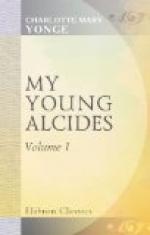When we reached Therford he would not go to the house with me, nor seek to see Eustace before the wedding, saying he should wait in the churchyard and join us afterwards. So in I went into the scene of waiting, interspersed with bustle, that always precedes a wedding, and was handed into the bed-room where the bridesmaids were secluded till the bride was ready, all save Pippa and the most favoured cousin, who were arraying her. There were a dozen, and all were Horsmans except Dora and me. The child made one great leap at me, and squeezed me, to such detriment of our flimsy draperies that she was instantly called to order. Her lip pouted, and her brow lowered; but I whispered two words in her ear, and with a glance in her eye, and an intent look on her face, she stood, a being strangely changed from the listless, sullen, defiant creature she had been a minute before.
Therford was one of those old places where the church is as near as possible to the manor house, standing on a little elevation above it, and with a long avenue of Lombardy poplars leading from the south porch, the family entrance, to the front door of the house, so this was that pretty thing, a walking, instead of a carriage, wedding. As one of the procession, I could not see, but the red and white must have made it very pretty, and the Northchester paper was quite poetical in its raptures.
All this was, however, forgotten in the terrible adventure that immediately followed. The general entrance was by the west door, and close to this I perceived Harold following his usual practice of getting into the rear and looking over people’s heads. When the service was over, and we waited for the signing of the registers, most of the spectators, and he among them, went out by this western door, and waited in the churchyard to see the procession come out.
Forth it came, headed by the bride and bridegroom, both looking their very handsomest, and we bridesmaids in six couples behind, when, just as we were clear of the porch, and school-children were strewing flowers before the pair, there was a strange shuddering cry, and the great bloodhound, Kirby, with broken chain and foaming jaws—all the dreadful tokens of madness about him—came rushing up the avenue with the speed of the wind, making full for his mistress, the bride. There was not a moment for her to do more than give a sort of shrieking, despairing command, “Down, Kirby!” when, just as the beast was springing on her, his throat was seized by the powerful hands that alone could have grappled with him, and the terrible head, foaming, and making horrid choking growls, was swung round from her, and the dog lifted by the back of the neck in the air, struggling and kicking violently.
Everyone had given back; Hippolyta had thrown herself on Eustace, who drew her back, crowding on us, into the porch; Harold, still holding the dog at arm’s length, made his voice heard in steady tones, “Will some one give me my other glove?”




